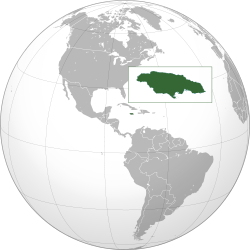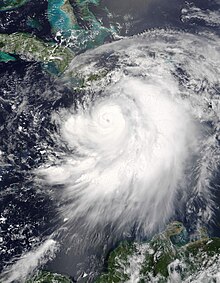Portal:Jamaica
The Jamaica Portal
Jamaica (/dʒəˈmeɪkə/ ⓘ jə-MAY-kə; Jamaican Patois: Jumieka [dʒʌˈmie̯ka]) is an island country in the Caribbean Sea and the West Indies. At 10,990 square kilometres (4,240 sq mi), it is the third largest island—after Cuba and Hispaniola—of the Greater Antilles and the Caribbean. Jamaica lies about 145 km (90 mi) south of Cuba, 191 km (119 mi) west of Hispaniola (the island containing Haiti and the Dominican Republic), and 215 km (134 mi) south-east of the Cayman Islands (a British Overseas Territory). With 2.8 million people,0 Jamaica is the third most populous Anglophone country in the Americas (after the United States and Canada), and the fourth most populous country in the Caribbean. Kingston is the country's capital and largest city. Most Jamaicans are of Sub-Saharan African ancestry, with significant European, East Asian (primarily Chinese), Indian, Lebanese, and mixed-race minorities. Because of a high rate of emigration for work since the 1960s, there is a large Jamaican diaspora, particularly in Canada, the United Kingdom, and the United States. The country has a global influence that belies its small size; it was the birthplace of the Rastafari religion, reggae music (and such associated genres as dub, ska and dancehall), and it is internationally prominent in sports, including cricket, sprinting, and athletics. Jamaica has sometimes been considered the world's least populous cultural superpower. (Full article...) Selected article -Kingston is the capital and largest city of Jamaica, located on the southeastern coast of the island. It faces a natural harbour protected by the Palisadoes, a long sand spit which connects the town of Port Royal and the Norman Manley International Airport to the rest of the island. Kingston is the largest predominantly English-speaking city in the Caribbean. The local government bodies of the parishes of Kingston and Saint Andrew were amalgamated by the Kingston and St. Andrew Corporation Act of 1923, to form the Kingston and St. Andrew Corporation (KSAC). Greater Kingston, or the "Corporate Area" refers to those areas under the KSAC; however, it does not solely refer to Kingston Parish, which only consists of the old downtown and Port Royal. Kingston Parish had a population of 89,057, and St. Andrew Parish had a population of 573,369 in 2011 Kingston is only bordered by Saint Andrew to the east, west and north. The geographical border for the parish of Kingston encompasses the following communities: Tivoli Gardens, Denham Town, Rae Town, Kingston Gardens, National Heroes Park, Bournemouth Gardens, Norman Gardens, Rennock Lodge, Springfield and Port Royal, along with portions of Rollington Town, Franklyn Town, and Allman Town. (Full article...)Did you know (auto-generated)
Selected biography -James Chambers, OM (born 30 July 1944), known professionally as Jimmy Cliff, is a Jamaican ska, rocksteady, reggae and soul musician, multi-instrumentalist, singer, and actor. He is the only living reggae musician to hold the Order of Merit, the highest honour that can be granted by the Jamaican government for achievements in the arts and sciences. Cliff is best known among mainstream audiences for songs such as "Many Rivers to Cross", "You Can Get It If You Really Want", "The Harder They Come", "Reggae Night", and "Hakuna Matata", and his covers of Cat Stevens's "Wild World" and Johnny Nash's "I Can See Clearly Now" from the film Cool Runnings. He starred in the film The Harder They Come, which helped popularize reggae around the world, and Club Paradise. Cliff was one of five performers inducted into the Rock and Roll Hall of Fame in 2010. (Full article...)General images -The following are images from various Jamaica-related articles on Wikipedia.
This is a Good article, an article that meets a core set of high editorial standards.
In early July 2005, Hurricane Dennis brushed Jamaica, bringing torrential rain and damaging floods to the island nation. Forming from a tropical depression on July 4, Dennis began impacting Jamaica three days later. Approximately 6,000 people evacuated from coastal and flood-prone areas prior to the storm's arrival while relief agencies allocated resources for recovery operations. Passing northeast of the island, impact from Dennis stemmed primarily from rainfall—accumulations peaked at 24.54 in (623 mm) and reached 1-in-50 year event levels. Widespread flooding and landslides damaged homes and isolated communities. Saint Thomas and Portland Parishes were hardest-hit; hundreds required evacuation as multiple rivers burst their banks. Overall, 209,000 people were affected with 6,000 households requesting assistance. A week after Dennis, Hurricane Emily brought further rain to the island, exacerbating damage. Their combined effects damaged or destroyed 440 homes with total losses reaching J$5.976 billion (US$96.87 million), of which at least J$2.128 billion (US$34.5 million) can be attributed to Dennis alone. One person died due to flooding. Relief operations began before the hurricane subsided, and international communities provided further aid. The overall effects of Dennis were limited and the nation's economy sustained no major ramifications. (Full article...)Selected picture - Bob Marley statue in Kingston, Jamaica
Selected cuisines, dishes and foods - The festivals or Jamaican festivals are a kind of deep-fried bread, typical of Jamaican cuisine. Despite its slightly sweet taste, is served as a side dish to dishes such as fried fish, escovitch fish or jerk chicken. It is a dough made with wheat flour, Cornmeal, baking powder, salt, milk powder unflavored milk or evaporated milk, sugar and water, then fried in a neutral cooking oil and served hot. The finished festival should be crispy on the outside while soft and fluffy on the inside. (Full article...)
More did you know
Selected listsTopicsCategoriesRelated portals
WikiProjectsGeographical:
History and Society:
Tasks
Associated WikimediaThe following Wikimedia Foundation sister projects provide more on this subject:
More portals | ||||||||||






















































